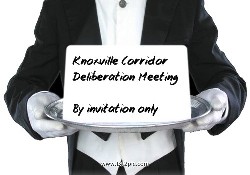 The Open Meetings Act (OMA) is hard to follow. Even people like me who want to follow it conscientiously can sometimes find that we’ve inadvertently violated it. So, I just want to acknowledge up front that you really have to be on your toes when it comes to OMA.
The Open Meetings Act (OMA) is hard to follow. Even people like me who want to follow it conscientiously can sometimes find that we’ve inadvertently violated it. So, I just want to acknowledge up front that you really have to be on your toes when it comes to OMA.
It’s a different story, however, when officials set out specifically to circumvent the OMA. In today’s Word on the Street, intrepid reporter Jennifer Davis revealed this about efforts to get consensus on the “Knoxville corridor” controversy:
There was a special meeting with all the stakeholders this past week, which the city wanted to keep closed. That’s fine, because we’ve been promised there will be public hearings on this issue.
Still, to avoid triggering the Illinois Open Meetings Act, the city had to ensure a majority of a quorum from either the City Council or a city commission didn’t attend.
Illinois Attorney General Lisa Madigan states that, “[i]n its present form, the [Open Meetings] Act is designed to ensure that public business is conducted in public view, by prohibiting secret deliberations and actions on matters that should be discussed in a public forum.” If what Jennifer Davis described isn’t “secret deliberations,” then I don’t know what is. They wanted to deliberate (definition: “consider a question carefully”) the matter secretly, so they found a way to do so without “triggering the Open Meetings Act.”
Of course, the justification for this is that “there will be public hearings on this issue.” But that’s the point — the public hearings are where this matter should be deliberated. If it’s going to be hammered out in a back room among representatives from the council and commissions, doesn’t that abort the whole public hearing process? I mean, if a consensus was already reached by the members of the secret panel, then the public hearing becomes nothing more than a formality. The result of the hearings is predetermined.
But here’s the goofy part: We already had public hearings on this. They were the public hearings for the Land Development Code. This was all aired then. Remember the result? The Planning Commission (on which Maloof Realty employee Suzi Miller sits) and City staff recommended 150-foot setbacks, but the Zoning and Heart of Peoria commissions recommended 80-foot setbacks. Then it went to council.
Now the deliberation should take place in council chambers during one of their semimonthly meetings. They have all the information from both sides. If they have any questions, they can invite representatives to the council meeting to explain — where everyone can hear them and where they will be on the record. Why the need for these secret meetings and further public hearings?
